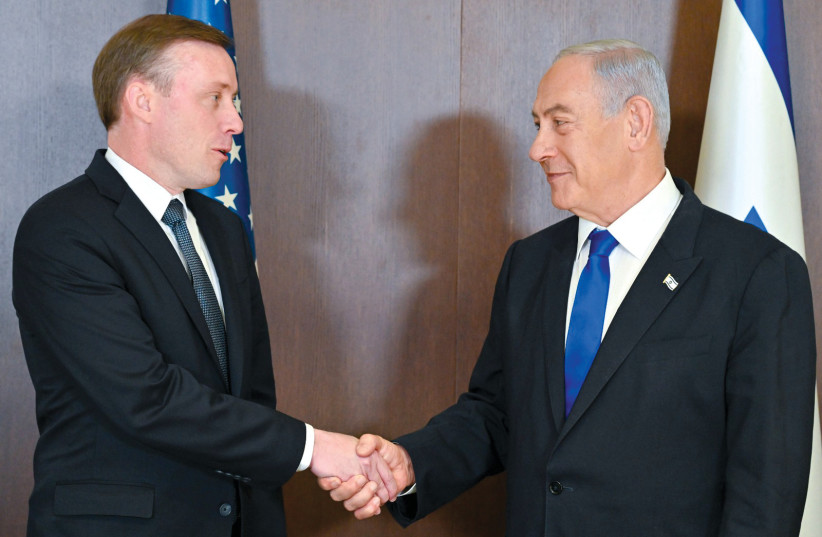Washington allows Israel freedom of action against the Iran nuclear threat, US National Security Adviser Jake Sullivan said.
“We have made clear to Iran that it can never be permitted to obtain a nuclear weapon,” Sullivan said in an address to the Washington Institute think tank on Thursday. “As President [Joe] Biden has repeatedly reaffirmed, he will take the actions necessary to stand by this statement, including by recognizing Israel’s freedom of action.”
“This is an issue that occupies the president’s attention, my attention, on a daily basis,” he said. “Iran’s program has advanced considerably. It is a genuine danger to regional security and to global security, and, indeed, to the United States of America. And we are going to continue to take action to, yes, deter Iran from getting a nuclear weapon, and then to seek a diplomatic solution that puts this on a long-term pathway of stability.”
The national security adviser said the US continues to use diplomatic channels regarding Iran’s nuclear program.

“The best way to stop Iran from getting a nuclear weapon is an effective agreement,” he stated. “I regard the decision to pull out of the Iran nuclear deal, the JCPOA, without anything to replace it or any strategy to deal with it other than the imposition of sanctions—which we have continued and added to actually—is not necessarily a pathway to a clear and straightforward [deterrence].”
Iran’s nuclear program is advancing
Sullivan argued that without a deal, Iran’s nuclear program is advancing, while an agreement would scale it back.
“We will continue to send a clear message about the costs and consequences of going too far, while at the same time continuing to seek the possibility of a diplomatically brokered outcome that puts Iran’s nuclear program back in the box,” he said.
Sullivan said the US is cooperating with partners in the Middle East to deter Iran, such as holding the largest joint military exercise ever between the US and Israel this year, and one of the largest naval military exercises in the history of the Middle East with over 50 countries, including Israel and Gulf states working together.
“There can be no doubt that we are walking the walk and not just talking the talk when we say that our commitment to Israel’s security is ironclad,” he said.
He also participated in meetings with Prime Minister Benjamin Netanyahu, National Security Adviser Tzachi Hanegbi, Defense Minister Yoav Gallant on deterring Iran.
Also on Thursday, Foreign Ministry Deputy Director-General for Strategic Affairs Joshua Zarka and Deputy Director-General for Euro-Asia Simona Halperin met with Russian Deputy Foreign Minister Sergei Ryabkov, primarily to discuss the Iranian nuclear threat and diplomacy related to the currently-defunct Iran nuclear deal, the Russian Foreign Ministry stated.
Asked when Netanyahu could expect to be invited to the White House, after Biden publicly spoke out against the government’s judicial reform plan, Sullivan said: “The president has had a very long relationship with Prime Minister Netanyahu, and we remain deeply engaged with the Israeli government day by day, so a lot of the sturm und drang in the media I think has been very much overblown.”
“When the time is right, and when we have a visit to announce, we’ll announce it. And until then, I think kind of speculating or describing or trying to set any conditions around it just doesn’t comport with the way Joe Biden does business, and never has done business anywhere, especially with a country he loves like Israel,” he said.
Sullivan spoke at length about the Abraham Accords, the agreements forged in 2020 between Israel, the UAE, Bahran and Morocco, in its various aspects, as well as American efforts to get Saudi Arabia to normalize ties with Israel.
“We are working to strengthen and expand the Abraham Accords, supporting Israel’s ultimate, final, complete integration into the Middle East region and the world,” Sullivan said.
The Biden administration has “the interest and the bandwidth to promote normalization between Israel and Saudi Arabia…Getting to full normalization is a declared national security interest of the United States, we have been clear about that.”
The opening of Saudi airspace to Israeli flights is “one step along the road toward what we hope will become a full normalization between Israel and Saudi Arabia,” he said.
The I2U2 forum of Israel, India, UAE and US is one “you will be hearing more about,” Sullivan predicted.
“The fundamental notion is to connect South Asia to the Middle East to the US in ways that advance our economic technology and diplomacy,” he said.
Sullivan also touted the Negev Forum, which brings together the Abraham Accords countries plus Egypt and the US to cooperate in a variety of areas.
